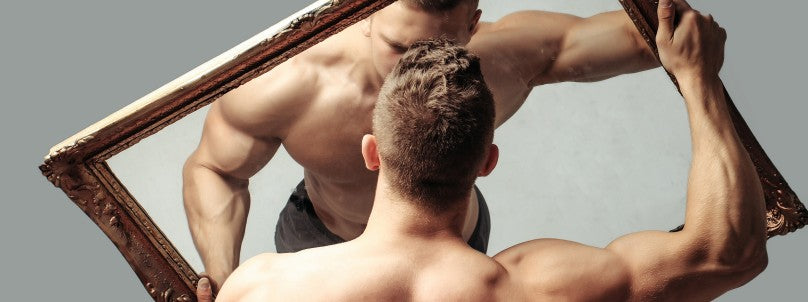
Male Eating Disorders and Body Dysmorphia
With body shaming and the media portraying unreasonable body expectations, it's no wonder that many eating disorders are on the rise. A subject often overlooked, the pressure to have a specific physique has been leading a rise in body disorders such as bulimia, anorexia, and body dysmorphia.
In the last six years, there has been a 70 percent increase in men seeking help for an eating disorder. It's been estimated that nearly 20 million women and 10 million men in the United States will suffer from an eating disorder sometime in their lifetime.
Related - Orthorexia Nervosa – When Healthy Eating Goes Too Far
Even celebrities such as Eminem, Dennis Quaid, and Aaron Carter have struggled with various eating disorders and body dysmorphia. With celebrities opening up about eating disorders, it's helping other men seek treatment. The stigma remains that seeking treatment isn't "manly" but taking care of yourself is.
Male-Prevalent Eating Disorders
As I said earlier, an estimated 20 million women and 10 million men in the United States will suffer from an eating disorder at some point of their life.
Common eating disorders such as anorexia, bulimia, and binge eating are as prevalent in males as they are in females. In fact, the past six years hospitals have experienced a 70 percent increase in male patients seeking help.
Male celebrities have been speaking out about their problems, making getting help an easier step. Dennis Quaid lost more than 40 pounds due to anorexia in the 90s. He said he wasn't satisfied with his body for a long time. Eminem replaced a drug addiction in 2007 with an eating disorder as he plummeted from 230 pounds to 149 pounds.
Even though the stigma still remains that an eating disorder isn't "mainly" keeps pressure on someone from opening up about it. We've been pounded into our heads from the beginning to be strong, fit, and a protector of your family.
This overall pressure has even turned young boys to anorexia in order to fit the physical image they think is needed. With more treatment being available for women, including female-only clinics, male-only treatment facilities have slowly begun to rise. In 2013 there was a 69 percent increase in programs.
 

 
Spot Eating Disorders In Others
Spotting eating disorders can be hard. Fortunately, there are a few tell-tale signs that somebody may have an eating disorder.
- Skipping meals
- Complaining about size when they are not overweight
- Weighing themselves daily and critiquing their appearance in the mirror
- Avoiding eating with others - "I've eaten already" or "I'll be going out to eat soon"
- Cooking plenty of food for others while barely eating any of the food
- Only eating "clean foods" in the presence of others
- Feeling uncomfortable eating in public
Eating disorders can ruin lives if untreated. If you are reading this and suffer from any of these symptoms, get help.
I personally deal with binge eating and signs of anorexia. I personally can hold myself accountable for all but cooking for others. There's help out there, so get it.
What Is Body Dysmorphia?
A completely different disorder, body dysmorphia can lead to worse habits such as anorexia or bulimia.
Body dysmorphia disorder is when someone thinks about their real (or perceived) flaws for hours every day. Sure, we all have that trouble area we want to work on, but those with this disorder fret and worry about it constantly.
It is so bad that they cannot control their negative thoughts about themselves, regardless of what people tell them. Missing work, school, or social situations due to the fear someone will notice their flaws are common.
Body dysmorphia happens as equally in men as it does women.
Symptoms of Body Dysmorphia
Those who may have BDD may also suffer from some other compulsive behavior to try to hide or improve any flaws they think they have.
- Camouflaging (hair, body position, hats, etc.)
- Comparing themselves to others' appearance
- Seeking out plastic surgery
- Checking themselves in every mirror OR avoiding every mirror
- Skin picking
- Excessive grooming
- Excessive exercising
- Changing clothes excessively
This, in conjunction with an eating disorder, plagues your mind every hour. Many who suffer from BDD may also suffer from other disorders such as social anxiety, depression, OCD, or an eating disorder.
Getting Help
Coming from someone who deals with disorders themselves, it's okay to dislike your body. Focus on improvement and getting help for any disorders you may be forming.
Just as media portrays a Barbie-like appearance for women, the superheroes and male models do the same to males. The increase in research and people reaching out about male eating disorders will help lead to more treatment options and more information available to get help.
If you suffer from or know someone suffering from an eating disorder or body dysmorphia, take the time to learn their situation and urge them to get help. Things get easier when someone can help guide you.
So quit wasting time and get the help you need.

Comments
Leave a comment